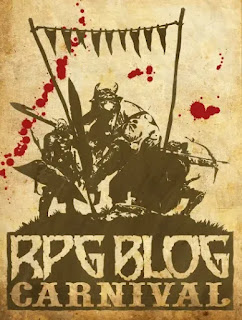Saturday, 7 October 2023
Archaeology and Anthropology - Blog Carnival Roundup
Saturday, 30 September 2023
'Loot the Body' Tables as Cultural Worldbuilding
 |
| A High Wennish woodcut depicting an Ald among Old Wenfolk |
A looted item is a question.
"What is this for? Why did this person have this? How did they acquire it?"
Players will naturally think these questions upon discovering an item. So, items are an effective tool in getting your players to naturally engage with a world and formulate their own opinions and theories about it. This is always preferred to walls of text, exposition or nondiegetic DM authorial asides. Because of this I have created some lists for what can be found in the pockets of four different cultures of people that can be found in a region of the otherwise unnamed; Beneath Foreign Planets setting called The Querns. The theory is this; by creating thought-out, culturally specific what's in my pocket? or 'I loot the body' tables, players will become more familiar with the material culture of each group of people and, to some extent, employ anthropological thinking about that culture. To enforce that feeling I won't be telling you anything about the cultures presented in the lists.
Books, pamphlets, letters and the like can provide local, regional or world rumours. Maps provide hooks. Cult paraphernalia can lead to dungeons and conspiracies.
The tables can be used as with a d6 and a d20 or with a d120 (which is done using a d12 and a d10) or by asking players to all separately roll a d20 and assigning each player to one of the sub-tables. This last method is the most useful when the party is doing mass looting. Roll as many d20s as corpses being looted and cycle through the tables, one after another, one die at a time. The tables are useful for staring items and pickpocketing also.
Sunday, 27 August 2023
Anthropology and Archaeology; A Blog Carnival Call-to-Arms!
 |
| Moulid el-Nabi |
- The scientific study of material remains (such as tools, pottery, jewelry, stone walls, and monuments) of past human life and activities.
'Anthropology and Archaeology' is a broad theme; effectively encapsulating the entirety of human experience. It is a perfect theme for world-building, easily links into whatever you are currently working on and most importantly, it might prompt you to think like a anthropologist or archaeologist - thinking about the 'why?' and the 'how?' and the 'what would that mean?' of your setting and everything in it. Doing so will take your thinking up a notch and will ultimately lead to a more engaging, considered and verisimilitudinous world (even with the most gonzo of settings).
 |
| Wilhelm Kuhnert |
Questions and Prompts:
Here are some potential topics to get you thinking before September begins:
- What might player-characters find it they just start digging?
- How academic are you feeling? Write a short ethnography of a people and their practices from your world.
- Could a character's starting equipment be culturally specific? Surely, different cultures in your setting have potentially very different equipment lists for your players to paw through?
- What archaeological periods exist in your setting and what sort of items would an archaeologist (or dungeoneer) find for each of those periods?
- Could culture result in character class differentiation? For example, how might a magic-user from the Fungal-Id culture differ to their counterpart from the Industrious and Munificent city of Hsan?
- Could you create mechanics that support or incentivize players to have their characters act according to their cultural or religious beliefs?
- Could you replace race-as-class with culture-as-class? If so what would those cultures be like?
- What adventure or adventure hooks might be given by an anthropologist or archaeologist in your world?
- 'The Archaeology of Magic' just sounds cool, right?
- Get meta and promulgate a variety of in-game worldviews and theories by writing a list and summaries of setting-specific anthropological books and treatises that your player-characters can find and read.
- There are a host of generators you could create - a ruin or archaeological dig-site generator, a broad-strokes culture generator, archaeological artifact generators, clothing, taboos, religious customs, food, ceremonies, rites or special days/events generators.
- Even in very small countries, one community's culture will differ from another's - what local or regional differences can be observed in a section of your world and why do/did those differences occur?
- Could you make a mini-game or mechanic for a cultural event, rite, festivity or ceremony to engage your players with?
- How do different cultures grapple with fantastic concepts such as the existence of cosmic Law, Chaos and Neutrality?
- Flesh out a culture from your game, there are so many different avenues to do this - etiquette and taboos, special days or events, clothing, food culture, religious beliefs and customs,
- Create cultural treasure or 'loot the body' tables (this is what I will be doing)
- Could a micro-setting be created around a particular social theory, so a purely functionalist, structuralist, materialist, marxist or even a social-evolutionist world?
- Furthermore, could you create mechanics that incentivize players acting in ways that conform with your chosen social theory?
- Acculturation is when cultures assimilate. Are there places in your world where two very different cultures have begun to fuse? What conflicts would result from this process and what might the new culture be like?
- How has a beast, fantastic species, divine intervention, curse or magical material affected the development of the people who live with it?
- What would Durkheim say about your dwarves? Franz Boas about your Bugbears?
- How would the culture of non-humans logically work? If you think about it, Elves would be very strange indeed. How do reciprocity and kinship work among aboleths?

